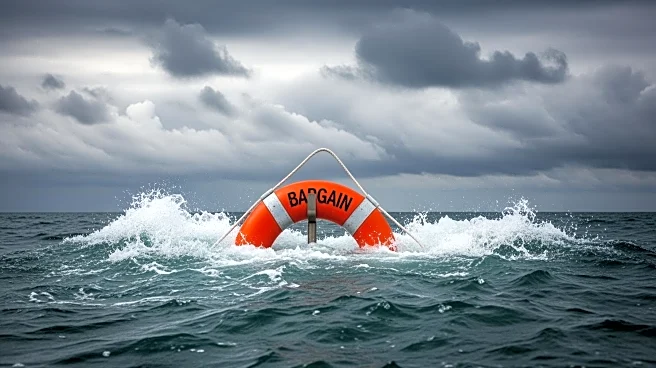What's Happening?
A 60-tonne boat, purchased for £1, was sunk by the coastguard after it became a hazard in Devon's shipping lanes. The vessel, named Faithful, was sold by Brixham Marina and encountered difficulties 30
miles into its journey, leading to a rescue operation by the RNLI. The Maritime and Coastguard Agency (MCA) decided to sink the boat due to its unseaworthy condition and the owner's inability to recover it. The decision has sparked concerns among local fishermen about the potential hazards posed by the wreck, which could damage trawler nets and endanger lives. The exact location of the wreck has not been widely communicated, causing further alarm in the fishing community.
Why It's Important?
The sinking of the Faithful highlights the growing issue of abandoned boats and the challenges they pose to maritime safety and environmental protection. The decision to sink the vessel, which carried two tonnes of diesel, raises environmental concerns about potential fuel leaks affecting marine life. The incident underscores the need for better communication and coordination between maritime authorities and the fishing industry to prevent accidents and ensure safety at sea. It also reflects the financial and logistical burdens faced by ports and harbors in dealing with abandoned vessels, which often lack insurance and require costly disposal.
What's Next?
The coastguard's actions may prompt a review of policies regarding the handling of abandoned vessels to prevent similar situations in the future. There may be increased pressure on maritime authorities to improve communication with the fishing industry about potential hazards. Additionally, the incident could lead to discussions on the responsibilities of boat owners and the need for stricter regulations to ensure vessels are seaworthy before setting sail. Environmental groups may also advocate for more sustainable solutions to deal with abandoned boats to minimize ecological impacts.
Beyond the Headlines
The case of the Faithful reflects broader issues of maritime governance and the economic pressures on coastal communities. The romantic notion of owning a boat can quickly turn into a financial and legal burden, as highlighted by the challenges faced by ports in managing abandoned vessels. This incident may serve as a cautionary tale for potential boat buyers, emphasizing the importance of due diligence and awareness of hidden liabilities. It also raises questions about the balance between economic opportunities and environmental stewardship in maritime activities.











